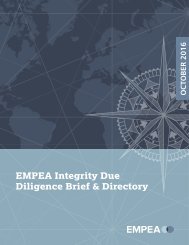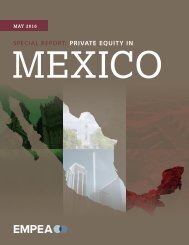Create successful ePaper yourself
Turn your PDF publications into a flip-book with our unique Google optimized e-Paper software.
Rwanda is not included in any <strong>of</strong> the classifications <strong>of</strong><br />
financial centres, but has expressed a desire to become the<br />
financial hub <strong>of</strong> the East African Community. It is likely that<br />
measures will be implemented in support <strong>of</strong> this objective<br />
over the next five years. Rwanda has not had an OECD<br />
Global Forum review.<br />
The Seychelles is classed as a financial centre and has<br />
legal provision for the registration <strong>of</strong> international business<br />
companies (IBCs) and <strong>of</strong>fshore banks. The country has<br />
the most secretive environment <strong>of</strong> the African jurisdictions<br />
reviewed here, according to the FSI ranking. After going<br />
through the two Phases <strong>of</strong> the OECD Global Forum exercise,<br />
the country was rated ‘Non-Compliant’ with international<br />
standards.<br />
South Africa is the main financial centre in Africa, in the<br />
sense <strong>of</strong> being the largest and most diverse. It has a wide<br />
range <strong>of</strong> banking operations, including both domestic<br />
and international banks; South African banks have an<br />
increasingly wide range <strong>of</strong> operations throughout the<br />
continent. Other financial institutions, including insurance<br />
and asset management, also operate regionally from<br />
South Africa. The JSE is by far the largest and most liquid<br />
securities market in Africa, and is indeed one <strong>of</strong> the largest<br />
emerging market exchanges in the world. The country has<br />
good travel and communications linkages, a broad and<br />
deep range <strong>of</strong> financial institutions and skills, sophisticated<br />
business services, and good corporate governance.<br />
However, it has a poor reputation for allowing companies to<br />
bring in expatriates to meet skills gaps, as the immigration<br />
system is very restrictive. The main financial centres are<br />
Johannesburg (for banking and securities) and Cape Town<br />
(for asset management).<br />
The country is also the origin <strong>of</strong> several Africa-focussed<br />
investment funds, which, however, tend to be domiciled in<br />
Mauritius. Some funds are domiciled in South Africa, but<br />
these are largely focussed on domestic (i.e., South African)<br />
investments rather than outside <strong>of</strong> the country. Despite<br />
its many advantages, South Africa has largely failed to<br />
attract externally focussed investment funds, for a number<br />
<strong>of</strong> reasons. First, there is no dedicated legal or regulatory<br />
regime for international investment funds or financial<br />
activities more broadly. Second, South Africa has extensive<br />
exchange controls on capital movements, and these provide<br />
a major disincentive for international banking and fund<br />
activities, because they introduce a major level <strong>of</strong> delay<br />
and uncertainty to external financial transactions. 10 Third,<br />
despite the cosmopolitan nature <strong>of</strong> major South African<br />
cities, the high crime rate provides a major disincentive to<br />
international migration, which is compounded by a restrictive<br />
immigration policy. Fourth, South Africa has relatively high<br />
corporate tax rates.<br />
However, although several investment funds originating in<br />
South Africa are legally domiciled in Mauritius, much <strong>of</strong> the<br />
substantive investment advisory and asset management<br />
work is still carried out in South Africa.<br />
South Africa has the best (i.e., lowest) score in terms <strong>of</strong><br />
financial secrecy under the FJN ranking. It is the only African<br />
country to be fully ‘Compliant’ with international standards<br />
as per the OECD Global Forum exercise. The GFCI rates<br />
Johannesburg as an “Established Player” in the category <strong>of</strong><br />
Local Financial Centres.<br />
Botswana established its International Financial Services<br />
Centre (IFSC) in 2004. The IFSC makes provision for a<br />
reduced tax rate (15%) for approved companies. Although<br />
the IFSC was originally intended to be focussed on financial<br />
services, in practice it has attracted a broader range <strong>of</strong><br />
business services, particularly holding companies for firms<br />
that operate across different African countries, rather than<br />
banking and fund management. Botswana has a good<br />
reputation for macroeconomic and political stability, and has<br />
the highest sovereign credit rating in Africa. There are no<br />
foreign exchange controls.<br />
However, the IFSC has been slow to take <strong>of</strong>f, particularly<br />
for financial services. Although the general level <strong>of</strong><br />
corporate governance is good, Botswana has been held<br />
back by somewhat out-dated legislation, a slow response<br />
to regulatory modernisation, a lack <strong>of</strong> transport links<br />
(especially international air travel connections), a shortage<br />
<strong>of</strong> specialised skills and a restrictive immigration policy<br />
that makes it difficult for firms to bring in skilled personnel<br />
from outside the country. The country also lacks the range<br />
<strong>of</strong> DTAs that Mauritius and South Africa have, and has a<br />
higher effective tax rate than Mauritius. And unlike Mauritius,<br />
the Botswana IFSC requires approved investors to have a<br />
physical (and not just legal) presence in the country.<br />
10<br />
While exchange control approval for transactions in goods have generally been delegated to the commercial banks (authorised dealers) by the South<br />
African Reserve Bank (SARB), this does not apply to financial services transactions to the same extent. Furthermore, capital account transactions above<br />
a certain size are generally not subjected to such delegated approval. The time taken for SARB review extends the transaction process, and in addition<br />
because approval <strong>of</strong> capital outflows is discretionary, approval may be conditional. This all adds delay and uncertainty, especially for complex transactions.<br />
<strong>Conduits</strong> <strong>of</strong> <strong>Capital</strong> – Onshore Financial Centres and Their Relevance to African Private Equity<br />
| 75





